Film Name: 刀尖 / Seven Killings
I went to the screening of Seven Killings yesterday with high expectations, and was disappointed.
I believe that many of the viewers who are concerned about this movie are attracted by the name “directed by Gao Qunshu + original work by Mak”, after all, that year’s espionage movie “The Message” with the name of two people is the heart of many viewers – but I would like to remind you that But I have to warn you, don’t think of Seven Killings as another “The Message” because it’s not much of a spy movie, and it’s too flat, lacking a climax, and the plot isn’t coherent. ……
Although it was made five years ago and the three-and-a-half-hour-long film was eventually gouged down to two hours by the director himself, these factors are not what the viewer has to consider.
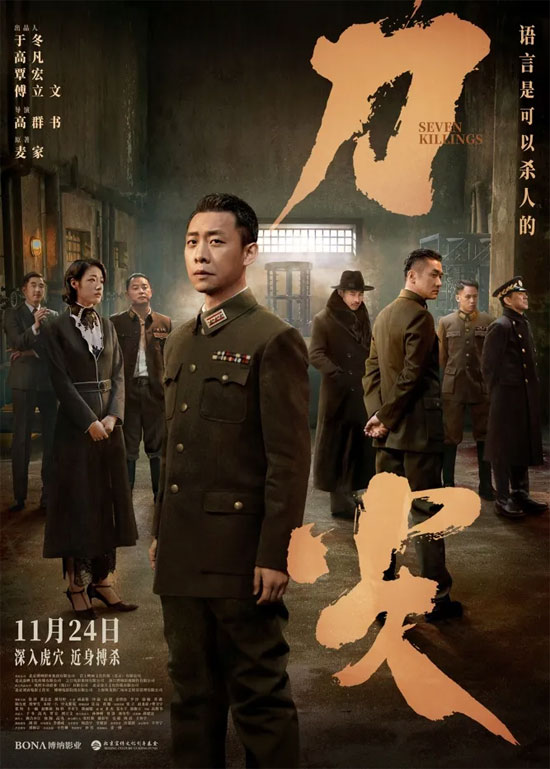
To be honest, Seven Killings is not good enough, and halfway through, I was getting more and more confused, until I suddenly realized that it’s about “the choices ordinary people make in the face of family feuds and darkness”, and then I accepted the story that became more and more scattered and fragmented later on.
With a solid historical narrative, plus good cinematography, graphics and “tone”, this movie is not so bad as to be useless.
(Friendly reminder: there will be plenty of spoilers below.)
Many viewers went to see Seven Killings for the spy drama, the film’s promotional materials were also geared in that direction, and it does play out in the first half of the movie, so that’s where we’ll start.
In 1940, Bai Dayi, an expert in secret telegraphy who was being closely guarded by the Japanese army, is assassinated, and the Security Bureau of the wannabe government in Nanking investigates the matter under the irascible pressure of Takeshi Fujiwara, a Japanese liaison officer.
The leak and the assassination are carried out by Jin Shamshui (Zhang Yi) and Lin Yingying (Lang Yueting), military intelligence agents lurking in the Security Bureau, who have to find a way to survive the crisis. Jin Shamshui’s plan for self-preservation is to take advantage of the political struggle between Lu Jingyu (Huang Zhizhong), the head of the Bureau, and Yu Zhiren (Gao Jie), the deputy head and vice minister of the police department.
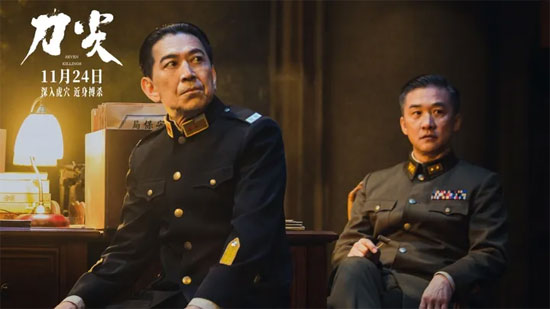
Unlike The Message, which has a strong element of suspense and secret rooms, Seven Killings deals with espionage with all the cards in the deck, saying what it says.
The advantage of the movie is that it is a clear, no-brainer. Taking the opportunity of the Security Bureau’s Anti-Special Branch to bend over backwards and frame the police for a crime, Lin Yingying kills a man with a borrowed knife and takes out the head of the Anti-Special Branch in Yu Zhiren’s lineage, Li Shiwu (played by Shah Yee), pushing the conflict between Lu Jingyu and Yu Zhiren to the forefront, which is simple and easy to understand.
But the plot is too straight to give the bad side is the lack of ups and downs, a can kill the whole spy drama like plain water, and also with a transparent sealed bottle – bland, tasteless, all visible and no waves, Lin Ying Ying pregnant to expose their identity, intercepted and killed the Security Bureau of the confidentiality of the deputy director of the Qin time (Jin Shijia), Jin Shamshui found out that the other party is a CPC The plot of the series is so explosive that it doesn’t make people excited.
Compared to the dullness of the drama, Seven Killings is significantly better in terms of visual presentation, such as headshots, executions, torture by clamps, hangings, and a lot of other “restricted” violence are unreservedly present, adding a rare fishy flavor to this bottle of boiling water…. …the scale is large, which is more or less a plus point for a domestic movie.
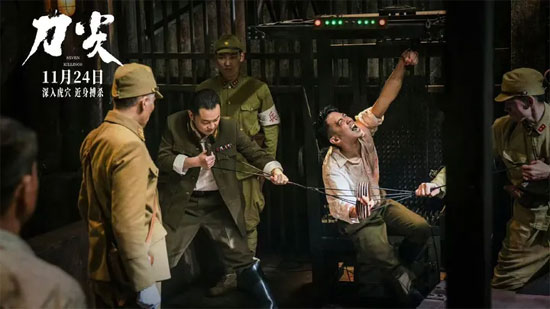
Of course, the film’s visual strengths are more in the shots and colors, such as the reflective imaging of Jin Sham Shui picking up the broken glass and the fish jumping off the plate after Chen Yao’s suicide, all of which are good shots that combine aesthetic beauty and suggestive of the character’s situation, as well as the film’s beautifully captured landscapes in Jiangnan – the director of photography for Seven The director of photography for “Seven Killings” is Liu Yin from “The Wandering Earth” series, and his influence is still evident.
In addition, the movie also does a good job in terms of lines, actor’s demeanor, professional notes, etc. I think it has the tone of a spy movie, and the foundation is definitely over the top, with occasional surprises. For example, after the death of Li Shiwu, Lu Jingyu invited the people of the Security Bureau to dinner, the rest of the people in his speech when he raised his glass, but Yu Zhiren bowed his head and ate the food, and only at the end of the pretense of folding chopsticks to make a statement, the flavor, at a glance, it is clear.
Unfortunately, those aforementioned merits do not change the fact that Seven Killings is not good enough.
No matter how rich the original novel is, a movie adaptation must consider the integrity of the narrative and the characters, and the movie fails at both.
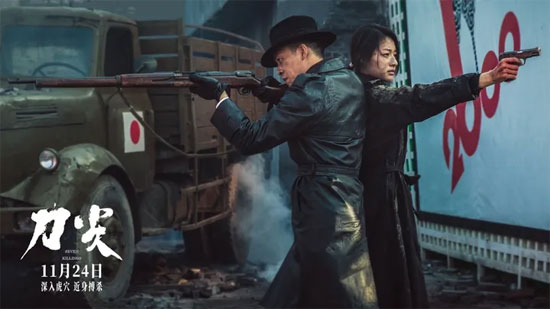
After the picketing of the Security Bureau comes to an end, Seven Killings quickly descends into a state of overwhelm, mainly in showcasing the wandering of Jin Sham Shui and Lin Ying Ying and the others, while the later scenes of assassinating Japanese medical expert Tengchun as well as smashing up the secret experimental base are more akin to a hocus-pocus in this state of overwhelm, and the effect is not much better than any of the anti-Japanese dramas that we usually criticize.
The story is not told well, the characters are often written in a way that they drift and get lost, and the shooting of big scenes is like child’s play, so don’t blame a large number of viewers for being disgruntled.
If I had been watching this movie with this mindset, I would have classified “Seven Killings” as a completely bad movie until the middle of the movie, when Jin Shamshui disregards the order to disclose the information about the assassination of the CCP underground party by the Military Intelligence to Lin Yingying and the others after the incident in South Anhui Province, and then I suddenly felt that I should look at this movie from a different perspective.
Compared to the “spy war” or “resistance war”, the movie’s greater attraction lies in the protagonist’s seemingly resolute but actually chaotic choices.
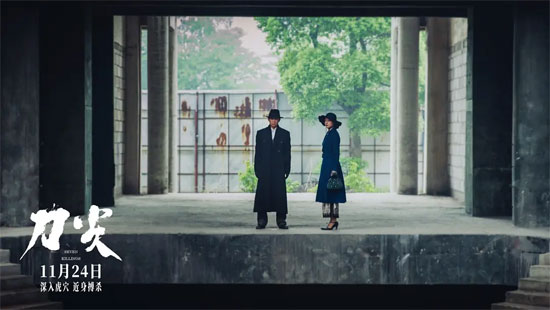
Seven Killings is set in 1940’s Nanjing, which was under the jurisdiction of the Nationalist government of Nanjing, facing off against the Nationalist government of Chongqing, and with the Japanese as the de facto rulers, and the anti-Japanese underground party, it became a natural breeding ground and a place of chaos.
There are two moments in the movie that stand out for me, one is when Fujiwara Takeshi scolds the Security Bureau, and some people complain in a roundabout way but don’t dare to speak out, and the other is when Lu Jingyu says at a drinking party that they are bearing the blame and humiliation for the sake of “peace” – even though they all know that they are dependent on the Japanese for their lives. Even though they all knew that they were traitors who survived on the backs of the Japanese, they still had to whitewash and paralyze themselves on the surface.
Under these circumstances, Jin Shamshui, a Junta agent, was originally resolute, but as the infiltration mission deepened and Lin Yingying appeared, everything began to blur.
Take a look back at why Jin Shamshui joined the anti-Japanese cause: the invading Japanese army killed his wife and children, and he entered the military junta for revenge.
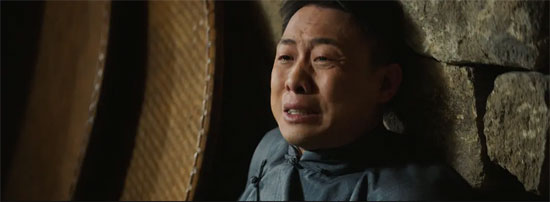
Revenge and hatred were the fundamental motives for millions of ordinary Chinese to join the resistance against Japan. In other words, Jin Shamshui possessed a kind of commonality with the people of the time, who did not care much about any doctrine or leader, but only wanted to realize their own wishes through a certain resistance organization.
At this point, the importance of a “leader” becomes apparent. Jin Shamshui meets Chen Yao of the military regime, and naturally enters the military regime, after which he realizes in hindsight that he has walked into another dark path when he wanted to kill the Japanese to vent his anger.
In contrast, Lin Yingying, whose family was also massacred by the Japanese, meets her comrades in the underground party first, and is set on a more rocky path.
Seven Killings shows the choices made by this group of ordinary people, who originally shared the same underpinnings and started from much the same place, but gradually came to different ends as they went through more and more experiences (many of the traitors and rebels were also revolutionaries a few years earlier), from those who desperately tried to get money for themselves like Li Shiwu, those who took advantage of both sides of the fence like Lu Jingyu, and those who took advantage of both sides of the fence like Gelao (played by Stanley Cheng), to those who took advantage of both sides of the fence like Gelao (played by Stanley Cheng), who took advantage of both sides of the fence. (There are also people like Ge Lao (played by Sung Tae Sun) who are loyal to the party and the country and the leader, who are willing to die even though they know that they will be betrayed.
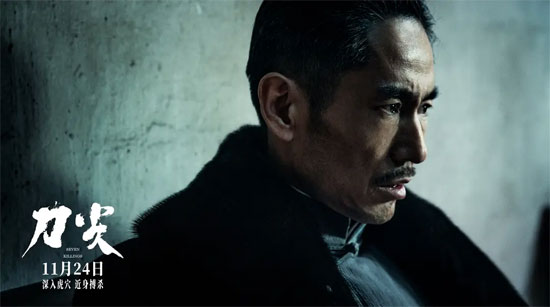
One of the most meaningful scenes in the movie is when Lin Yingying recites Wang Jingwei’s poem, “Singing generously in the city of Yan, being a prisoner of Chu with ease. “I have been a prisoner in Chu. I will not lose my youthful head if I use my sword.” The poem is used to show that the once-progressive youth may also be criticized later.
The invisible argument between Jin Shamshui and Lin Yingying about “who should live” has the same effect: although Jin Shamshui has a death wish, he still falls in love with Jingzi, a Japanese woman whom he has been ordered to approach, which means that he still has hope for the future, whereas Lin Yingying, who has lost her family, her lover, and her relatives, although she seems to be more energetic, is still in the process of giving birth to a child. After losing her family, lover and loved ones, Lin Yingying, although she seems to have more vitality, dies after giving birth to a child.
Only young people who are motivated to live, who are not yet completely stereotyped, have more hope to live and see the new China – Jin Shamshui, who has only been involved in the revolution for a few years, is such a “young man”. Jin Shamshui was such a “young man”.
From this point of view, the Security Bureau of the Wangfang Government, the Japanese Counterintelligence Group, the Kuomintang Military Intelligence, the Chinese Communist Party, and other organizations are nothing more than backdrops, and the only person who can make Jin Shamshui make a critical choice is himself.
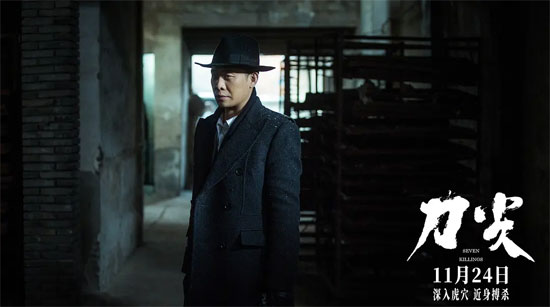
Full of hatred want to kill the devils, joined the Junta; for the anti-Japanese cause to work as a secret agent to deal with the traitors, can also be accepted; Dai boss with Chiang want to kill the New Fourth Army, engaged in internal fighting to deplete the anti-Japanese forces, tipped off; the Junta want to Nanjing station of the people to obey the order “to kill their own bodies”, quit; Lin Yingying in the loss of the organization but still want to complete the task, to help the field; After finishing the mission, she stayed in Jiangnan, bringing up her children and waiting for the opportunity to take revenge; after the victory of the anti-Japanese, Jin Shamshui went to Jiangbei and joined the CPC.
It can be said that Jin Shamshui’s simple choice to stay true to himself eventually led him to the most suitable and correct organization – aligning his personal destiny with the future of his family and country, tinting those who originally lacked an undertone with red, and forming some kind of inevitability in a sea of contingency, the tenor of this historical narrative became a reality.
I’m not sure if Seven Killings maintained such a high level of ambition when it was created – after all, the movie itself isn’t very good, and even if it is, it’s not well executed …… – but since the movie made my brain work, I’d give it a “selective viewing” recommendation. I’d give it a “selective viewing” recommendation.
Please specify:Anime Phone Cases » Seven Killings 2023 Film Review: A handwritten book of history in a scanty and straightforward manner